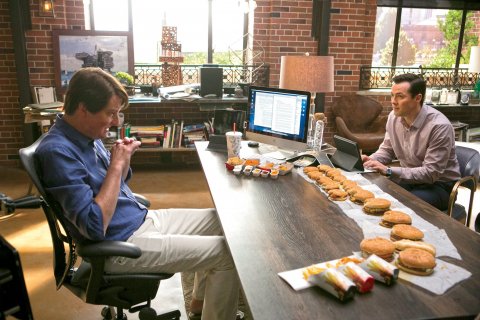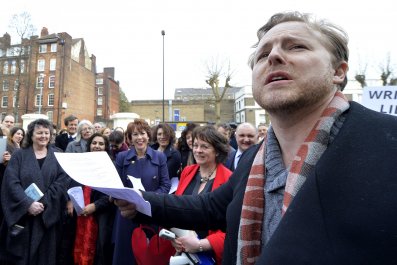In a yawning event space in midtown Manhattan, hundreds of people, mostly men, huddled around makeshift booths and standing tables. Most of them wore baggy pants, T-shirts with company logos and sneakers. But one man sported a neon green Martian suit, and a woman dressed like a Disney princess had a boa of money around her neck. The dim glow of smartphones flickered like a swarm of electronic fireflies. Welcome to TechCrunch Disrupt New York, a major technology conference where startups from around the globe pitch their apps and ideas in hopes of attracting investors (and perhaps getting a mention in Newsweek).
"Hey, you! Do you like the outdoors? No? Let me tell you about my app anyway."
"A picture a day keeps your mother-in-law away," read a sign for Minutta, a photo-sharing app for large families.
"We're the first app that enables people to pray using their smartphone. You need to write about us!" says Paul Dupuy, who proceeds to explain how I could pray for freedom or a sick relative using his new app, Pray. "It's not about religion," he adds.
I had decided to attend my first TechCrunch Disrupt after guffawing through the new HBO comedy Silicon Valley, Mike Judge's satire of the kindergarten-esque carnival that is today's tech epicenter. The show presents a world infected by insecure, name-dropping and socially moronic technology whizzes set on fixing humanity. The final two episodes of the first season take place at a fictional Disrupt—and yet many of the startup hopefuls standing before me had never seen the show.
"I think a lot of the tech crowd doesn't do cable," says Michael Wieckowski of ISI Technology, which took second place in the Disrupt Battlefield with its tankless water heater.
Alex Norman, founder of MyCoop, a social platform for residential buildings, has seen Silicon Valley and thinks it's a timely addition to the tech ether. "There needs to be a sense of humor applied to what we do. Very few people understand how ridiculous it is…. The show refreshingly allows me to laugh at myself, assuming that whatever's happening on the screen isn't happening with me!"
It seemed highly unlikely that the person who created two of the most well-known teenage lamebrains, some beer-bellied, conservative Texans and a crew of conniving workplace delinquents would be anything other than a socially awkward couch potato. And yet here was Mike Judge, the mastermind behind 1990s touchstonesBeavis and Butt-Head, King of the Hill and Office Space, walking toward me in a sharp black blazer, a black button-down shirt and crisply pressed pants. As he passed through the lobby of the Mandarin Oriental, just a few subway stops from Disrupt—his blue eyes beaming, his head neatly shaven—women as well as men stared as if they were trying to figure out whether he was an actor or simply a genetically blessed Average Joe. Judge was all business when he introduced himself, but a slight smile crept across his face, the kind perfected by mischievous college students who take their cues from Animal House's Eric Stratton, the rush chairman who was damn glad to meet everyone.
"When I was in college and high school, a desk job was a good job. It was like, 'You're not working construction.' That was a step up," Judge says in his low, soft drawl, speaking so evenly and earnestly it was easy to forget he is the Tolstoy of gross-out boy humor. "I had a temp job and thought, Wow, I'm working at a desk! But I was alphabetizing purchase orders.... Alphabetizing, you can't daydream.… The manual labor jobs or flipping burgers, you can think about other stuff. But sitting there—Amiho, Armstrong—I'd be alphabetizing in my sleep."
Judge, 51, grew up in Albuquerque, New Mexico. His father is an archaeologist, his mother a teacher and librarian; he always dreamed of going into comedy, but "my delusions of grandeur went away by the time I was 17," he says. "I just figured I'd be an engineer. Some kind of scientist." In 1983, he landed his alphabetizing purchase orders gig, and, two years later, after graduating from the University of California, San Diego, with a degree in physics, he became an engineer. "I always thought that's what you wanted, and then suddenly, with my first engineering job, it was, 'Wow, am I going to be doing this forever, for this many hours a day?'" He quit and became the bass player in a touring blues band.

Judge has a knack for turning the mundane into satiric sublimity, using nose picking, malfunctioning technology and bodily functions to mock everything that makes America, well, America. In Beavis and Butt-Head, which aired on MTV from 1993 to 1997, two teenage boneheads—both unattractive and unintelligent—spend their days avoiding school, setting things on fire, killing small animals and prank-calling strangers. These uncultured, music-video-loving dimwits were uncomfortably familiar, a shrewd commentary on a swelling MTV generation. King of the Hill, which aired on Fox from 1997 to 2010, followed Hank Hill, a redneck propane salesman in Texas. The show set its sights on middle America, with its stereotypically oafish culture and cultish conservativism. Office Space, his 1999 film, punctured the monotonous nuances of corporate America right before Tech Bubble 1.0 burst. And his 2006 film, Idiocracy, presents a dystopian future run by anti-intellectual simpletons, where a film called Ass, involving 90 minutes of farting, wins an Oscar for best screenplay.
Judge's new series, Silicon Valley, skewers the nerdy vortex of desperation and wild success in Northern California. The plot revolves around Richard Hendricks (the supremely awkward Thomas Middleditch), a 20-something college dropout who idolizes Steve Wozniak. ("Jobs was a poser. He didn't even write code," Richard says.) Along with a handful of fellow programmers, he lives in a startup incubator—a nerd fraternity turned tech war room where cleanliness is as rare as women. The place is run by Erlich Bachmann (T.J. Miller), a stoner know-it-all who owns 10 percent of each app created under his roof. There is Nip Alert, which does exactly what it sounds like it will do, and Bit Soup, an alphabet soup rebrand with ones and zeros instead of letters.
"My first engineering job, three of us were always sitting there, mostly joking, talking about some stupid idea like the Pet Rock," Judge says. "And the thing that's in the pilot, about Bit Soup; that was an actual dumb idea that we had."
What sets Silicon Valley in motion is Richard's music copyright program, Pied Piper, which has, hidden deep inside it, a killer algorithm that can compress any file to a fraction of its size. A bidding war ensues. An oddball angel investor, Peter Gregory (played by Christopher Evan Welch, who died of lung cancer at the age of 48, after filming the first five episodes of the first season), offers Richard $200,000 for 5 percent of the company. Peter's nemesis, Gavin Belson (Matt Ross), the slimy, bigheaded CEO of Hooli (a satirical take on Google), offers Richard $10 million for the whole business.
Richard decides to take the $200,000 and keep his majority stake, and we watch him bumble through trying to run a company, define its vision and create a viable product. All the while, the vultures are circling—brogrammers looking to steal his algorithm, Gavin aiming to beat him to market with a competing product. Richard is so nervous during his first meeting with Peter that he drinks air out of an empty cup. When he goes to the bank to cash his first check, he asks the teller if she can incorporate his company for him.
You don't have to understand the intricacies of the tech scene to appreciate the show, and that's because Judge is a master of lowbrow. Erlich's green T-shirt reads, "I know H.T.M.L. (How to Meet Ladies)." There's the Telehuman, a "holographic, 3-D teleconferencing technology" that Gavin paid $20 million for, a kind of Star Trek transporter-meets-video-chat that suffers a total meltdown. At a lavish party celebrating a fictional startup Google acquired for $200 million, guests slurp liquid shrimp ($200 a quart) and sip Champagne out of test tubes. Later, at a toga party, two gorgeous women introduce themselves to Richard and his friends. "We're actresses," one of them says. "What type actressing work?" Richard asks. The other woman smiles sweetly, responding, "Oh, we're working right now. Our startup sources actors to parties to liven things up and get in conversations with guests and be interested in them!"
As Judge puts it, "Social awkwardness is interesting to watch. Especially when there's a lot of money behind it."
There has been much discussion about whether Silicon Valley (and Silicon Valley) has a gender problem. In April, The New York Times ran an article called "Technology's Man Problem," citing the fact that women represent only about one-quarter of all information technology jobs, and more than half quit mid-career. According to the Labor Department, only 20 percent of software developers are women. In May, The Guardian published a story headlined "Women in technology: no progress on equality for 10 years." A few weeks ago, Newsweek's cover story investigated the challenges women face in the venture capital world.
In the first seven episodes of Silicon Valley, we meet only a handful of women, including Monica, an attractive brunette who appears to be either the assistant to billionaire Peter Gregory or a mid-level partner at his VC firm (if it's the latter, she sure does a lot of busy work). Programmer Bertram Gilfoyle's girlfriend, Tara, walks around the incubator wearing a hot pink satin robe and basically serves as a reminder to the rest of the guys that they have no clue what to do around women.
In April, after the first episode premiered, a woman tweeted at Judge: "Well @MikeJudge #SiliconValleyHBO is perfect but... TWO female characters the entire episode both in secretary/assistant type roles :("
He responded: "neither of those characters are assistants or secretaries. Why do you think that? just cuz they're female? Watch later eps."
When I asked him about the exchange, he sighed. "That one [tweet] in particular bugged me, because I was like, wait a second, she's actually a junior partner in the firm," he says, referring to Monica. "The percentage of women at VC firms is something like, I don't know, 10, and the percent that are actually partners is 4, so in a way, we're actually showing—to have a woman partner, we didn't have to do that."
He adds, "The shots of the audience in the seventh and eighth episodes are actual shots from TechCrunch that I took. I didn't say, 'No women allowed at TechCrunch!' It's a real audience—a sea of dudes with a few women. In a way, I think we're taking shots at this world for not having women in it.
"My younger daughter has a really high SAT math score. She could easily go into tech. She doesn't want to. And I'm not going to go, You need to get into tech! I know there are women in that world, and we're probably going to do more with it in the second season. But I don't know. It's a story about a group of guys."
Later, he added, unprompted: "It just occurred to me, I never once heard any women complain that there weren't any women in propane."
























